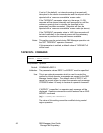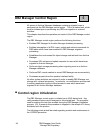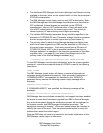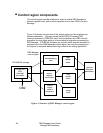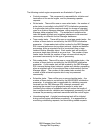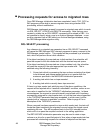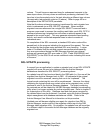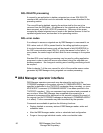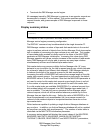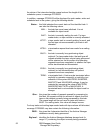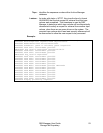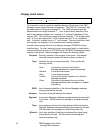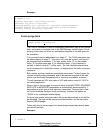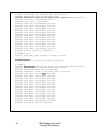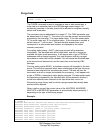50 DB2 Manager User Guide
StorageTek Proprietary
SQL DELETE processing
A request by an application to delete a migrated row via an SQL DELETE
command will cause that row to be retrieved via the process described in the
preceding section.
The row will then be deleted, causing the archive stub for the row to be
removed from the DB2 table. All reference to the migrated row will then have
been removed, as for SQL UPDATE processing. Recovery of the space
occupied by deleted migrated rows is made in an identical manner to that for
updated migrated rows, as described in the preceding section.
SQL error codes
If an attempt to access a migrated row by DB2 Manager is unsuccessful, an
SQL return code of –652 is passed back to the calling application program.
A two-byte hexadecimal reason code will be placed in field SQLERRD(6) in
the SQL communication area (SQLCA), giving the reason for the failure. In
many cases, the control region will also write an error message in the system
log.
Standard SQL error handling processing may be used by calling application
programs in order to deal with errors encountered during the migrated row
access procedure. No changes to existing error handling processing should
be required.
Refer to chapter 7 of the user manual for a list of the possible reason codes
generated by DB2 Manager during migrated row access processing.
DB2 Manager operator interface
DB2 Manager operator commands may be entered by replying to the
OTD20000 message on the system console (if COMMAND=REPLY has been
specified or defaulted in the TAPECNTL parameter library member), or via an
MVS MODIFY command (if COMMAND=MODIFY has been specified in the
TAPECNTL member). Only one command may be entered and processed at
any one time. When DB2 Manager has completed all processing for a
command a message will be displayed on the console indicating the result of
the request (and the OTD20000 message re-displayed if COMMAND=REPLY
is in effect). Further commands may then be entered by the operator.
Commands are available to perform the following functions:
• Display detailed or summary status of DB2 Manager reader, writer and
scheduler tasks.
• Alter the DB2 Manager reader, writer or scheduler task configuration.
• Purge or force purge individual reader, writer or scheduler tasks.



